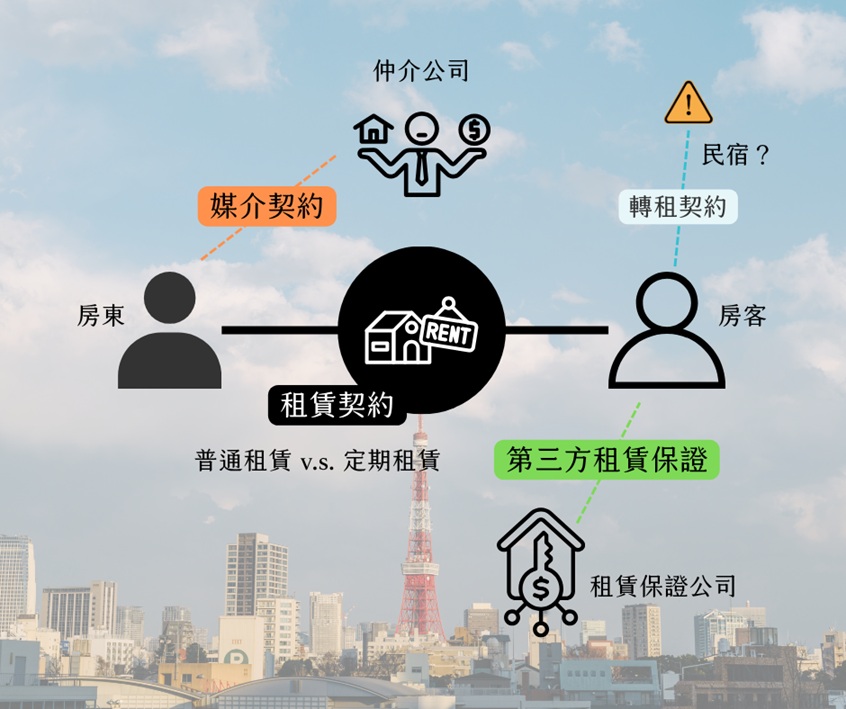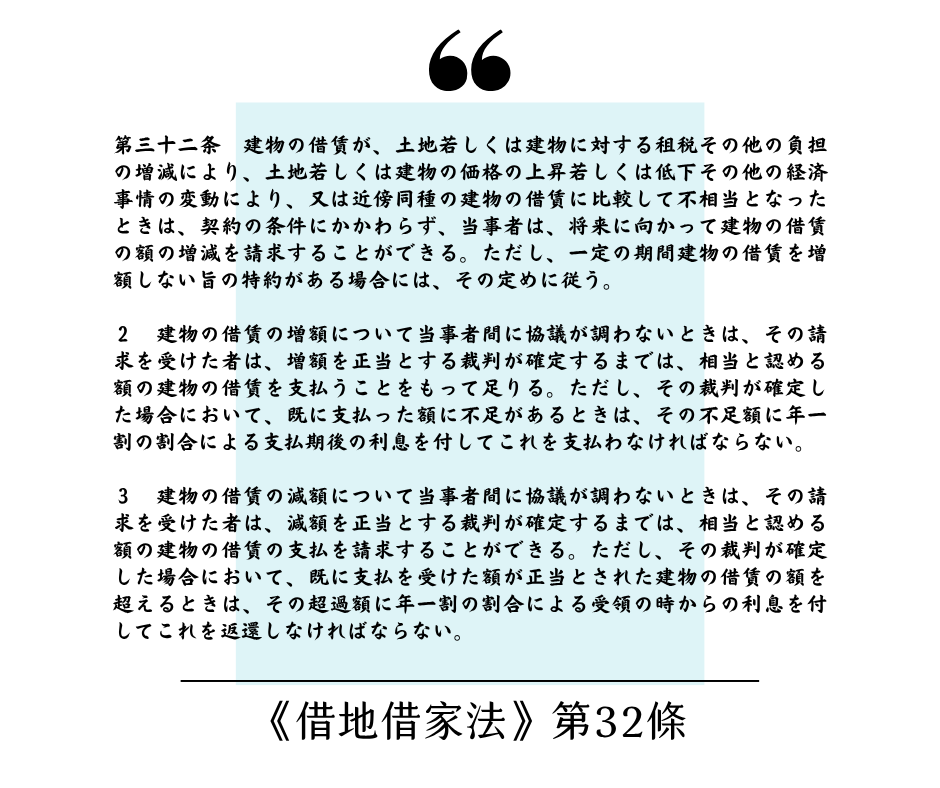Five Key Points You Should Know About Japanese Lease Contracts
In early 2025, a widely discussed controversy emerged in Tokyo, Japan: a Chinese landlord unexpectedly raised the rent by 2.5 times, triggering tenant protests and public backlash.
While this incident may appear to be a simple rent dispute, it actually reveals deeper fractures between foreign investors and Japan’s leasing system. In Japan, a “contract” is not just a legal document—it represents a mutual agreement and trust.
Without understanding Japan’s contract culture and legal framework, landlords, investors, and tenants alike may unknowingly fall into legal pitfalls.
This article will guide you through the common types of contracts in Japan, helping you grasp the essentials of Japanese contract culture and avoid becoming the next unlucky investor.

Investing in Japanese Real Estate? You Must Understand These Common Contract Types
Brokerage Agreement: The First Step Before Buying or Leasing
● A contract signed with a real estate agency that defines the scope of brokerage services, compensation methods, and exclusivity.
Lease Agreement: Your Direct Legal Relationship with the Tenant
● Clearly outlines the lease term, rent, security deposit, key money, renewal fees, and early termination clauses. Be sure to review each clause carefully when signing.
Ordinary Lease vs. Fixed-Term Lease: Major Differences in Renewal and Property Repossession
● Ordinary Lease: Automatically renews after the lease term ends; termination requires mutual consent.
● Fixed-Term Lease: Ends upon expiration and requires a new contract to continue. If both parties agree, it can be renewed → Suitable for short-term rentals or flexible property recovery.
Lease Guarantee Company: A Unique Safety Mechanism in Japan
● Acts as a third-party guarantor. If the tenant breaches the contract or fails to pay rent, the guarantee company covers the loss.
● Many landlords and real estate professionals consider this a basic risk management tool.
Sublease Contracts & Vacation Rentals: Unauthorized Subleasing is Illegal
● Subleasing requires prior written consent from the landlord.
● Using a regular rental property for Airbnb or other vacation rental operations is not only illegal but also undermines the validity of the original lease agreement.

Do Landlords Have the Right to Adjust Rent in Japan?
According to Article 32 of Japan’s Land and House Lease Law, landlords do have the right to request rent adjustments. However, this does not mean they can bypass contracts and procedures to arbitrarily change the rent.
In Japan, contract terms carry strong legal weight. If the contract does not clearly stipulate conditions for rent increases, the landlord must provide legitimate reasons and go through negotiation or legal procedures to adjust the rent. Sudden and unilateral rent hikes may constitute a breach of contract or even be illegal.
Here are several legal points where this incident may have violated regulations:
✖ 1. Unilateral Rent Adjustment Without Agreement Violates Contract Stability
Although Article 32 allows for rent adjustments, it requires mutual agreement or a court ruling. Rent cannot be increased simply through a public notice or verbal communication. Without tenant consent, such a rent hike is invalid.
✖ 2. Lack of Justification May Constitute Abuse of Rights
Japanese court precedents emphasize that rent increases must be based on reasonable grounds, such as rising taxes, inflation, or changes in market rates. The adjustment must be reasonable and supported by evidence. Without sufficient proof, the court may rule it as an abuse of rights.
✖ 3. If the Contract Includes a “No Increase Clause,” the Request Is Invalid
If the original lease contract explicitly states that rent cannot be increased within a certain period, the landlord cannot request a rent hike—even if market conditions change. Unless there is a significant socio-economic shift and the court approves the cancellation of the clause, the contract remains fully enforceable.
✖ 4. Forcing a Rent Increase Without Mediation or Legal Procedure Is Invalid
Even if the landlord has the right to request a rent adjustment, they must follow proper procedures, including written notice and mediation. Skipping these steps and enforcing a rent hike is not only invalid but may also put the landlord at a disadvantage in future disputes.

Don’t Want to Be the Next News Headline? Don’t Overlook These Three Key Contract Points!
✔ Key Points for Landlords to Protect Themselves:
● Choose the right contract type (fixed-term or ordinary) to maintain flexibility in property recovery.
● Use a lease guarantee company to strengthen risk management.
● Strictly follow contract terms—avoid unilateral rent increases or unauthorized subleasing.
Recommended Further Reading:
✔ Important Notes for Tenants:
● Confirm whether the lease is fixed-term and understand the possibility of renewal.
● All verbal agreements should be documented in writing.
● If faced with an unreasonable rent increase, seek legal assistance or administrative mediation.
More Recommended Reading:
Contractual Integrity: The Cornerstone of Real Estate Investment in Japan
Buying property is just the beginning—contracts are the key.
At the heart of Japan’s contract culture is not the protection of landlords or tenants alone, but the establishment of long-term, fair, and transparent relationships.
Whether you’re a landlord or a tenant, understanding the legal boundaries of contracts is the first step to navigating Japan’s rental market with confidence.
The Minami Aoyama Real Estate team in Tokyo has long served Taiwanese buyers and overseas investors. With deep expertise in Japan’s leasing system and contract practices, we help you avoid legal pitfalls and build a stable, long-term asset strategy.
Want to learn more about life and real estate in Japan?
Feel free to contact us or subscribe to our Facebook page or YouTube channel for monthly updates on everything you need to know about buying property in Japan!










